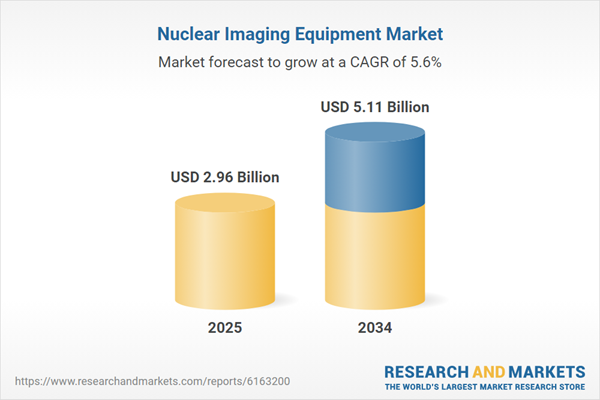Nuclear Imaging Equipment: Introduction
Nuclear imaging equipment are used to envision and evaluate the body organs in a human body. The equipment are used to observe the structure and working functionality of specific organs or all the organs present in the human body. To perform these observations, the healthcare professionals make patients administer a radioactive substance, which is also known as radiopharmaceuticals. The radiations a person experience with the amount and type of the radioactive substance being administered is minimal. These radiopharmaceuticals are used to examine and evaluate the path of the substance after its administration. The observation is being done on a molecular level.Global Nuclear Imaging Equipment Market Analysis
The continuous technological advancement in the field has been significantly aiding the nuclear imaging equipment market expansion. These technological advancements might include software updates and equipment modifications. The increasing investments on the research and development on finding new radiopharmaceuticals is also a key trend for the market. The discovery or innovation of new radiopharmaceuticals may help observe the functionality of organs in the patient that are suffering from cancer, as cancer imaging.Global Nuclear Imaging Equipment Market Segmentations
Nuclear Imaging Equipment Market Report and Forecast 2025-2034 offers a detailed analysis of the market based on the following segments:Market Breakup by Type
- Gamma Camera Imaging Systems
- SPECT Imaging Systems
- Planar Scintigraphy Imaging Systems
- PET Imaging Systems
Market Breakup by Applications
- Oncology
- Cardiology
- Neurology
- Others
- Urology
- Orthopedics
- Gastroenterology
- Thyroid-Related Disorders
- Others
Market Breakup by End User
- Hospitals and Clinics
- Diagnostic Imaging Centers
- Specialty Clinics
- Others
Market Breakup by Region
- North America
- Europe
- Asia Pacific
- Latin America
- Middle East and Africa
Global Nuclear Imaging Equipment Market Overview
The increasing prevalence of chronic diseases such as cancer and cardiovascular diseases, among others, has been driving the growth of the market. The increasing prevalence of chronic diseases has been contributing to the nuclear imaging equipment market growth. To diagnose these chronic diseases, use of nuclear imaging techniques such as positron emission tomography (PET) and single photon emission computed tomography (SPECT) is conducted. The nuclear imaging equipment market is witnessing steady growth and is expected to keep growing for the forecast period as well owing to the rising demand for imaging and proper diagnosis for these life-threatening conditions. The rising investment and funding by the key players and the governments is anticipated to contribute significantly to the nuclear imaging equipment market development.Additionally, factors like rising competition amongst the key players and the rapid development of equipment and devices is likely to bolster the growth of the market in the coming years.
Global Nuclear Imaging Equipment Market: Competitor Landscape
The key features of the market report include patent analysis, grants analysis, clinical trials analysis, funding and investment analysis, partnerships, and collaborations analysis by the leading key players. The major companies in the market are as follows:- Siemens Healthineers AG
- GE Healthcare
- Koninklijke Philips N.V.
- Canon Medical Systems Corporation
- Star Equity Holdings, Inc.
- SurgicEye GmbH
- Mediso Ltd.
- Rigaku Corporation (MILabs B.V.)
- MR Solutions Ltd.
- DDD - Diagnostics A/S
- Segami Corporation
- Mirion Technologies (Capintec), Inc.
- Positron Corporation
- Neusoft Medical Systems Co., Ltd.
This product will be delivered within 3-5 business days.
Table of Contents
Companies Mentioned
- Siemens Healthineers AG
- GE Healthcare
- Koninklijke Philips N.V.
- Canon Medical Systems Corporation
- Star Equity Holdings, Inc.
- SurgicEye GmbH
- Mediso Ltd.
- Rigaku Corporation (MILabs B.V.)
- MR Solutions Ltd.
- DDD - Diagnostics A/S
- Segami Corporation
- Mirion Technologies (Capintec), Inc.
- Positron Corporation
- Neusoft Medical Systems Co., Ltd.
Table Information
| Report Attribute | Details |
|---|---|
| No. of Pages | 350 |
| Published | July 2025 |
| Forecast Period | 2025 - 2034 |
| Estimated Market Value ( USD | $ 2.96 Billion |
| Forecasted Market Value ( USD | $ 5.11 Billion |
| Compound Annual Growth Rate | 5.6% |
| Regions Covered | Global |
| No. of Companies Mentioned | 14 |









